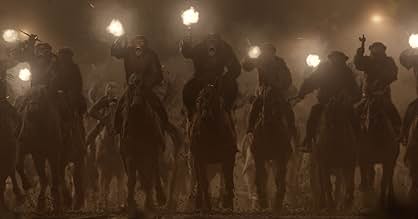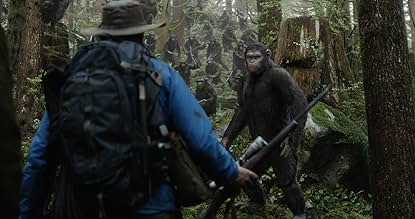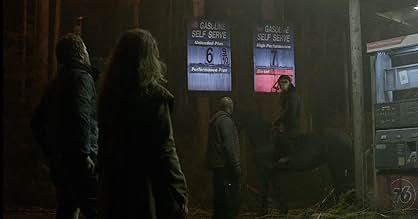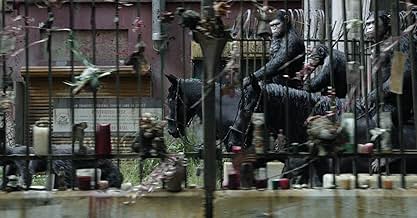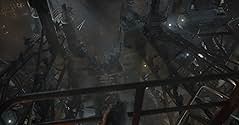Dez anos após sua liberdade, César vive em paz com macacos na floresta próxima a San Francisco, enquanto os humanos enfrentam uma epidemia. Sem energia elétrica, um grupo de sobreviventes pl... Ler tudoDez anos após sua liberdade, César vive em paz com macacos na floresta próxima a San Francisco, enquanto os humanos enfrentam uma epidemia. Sem energia elétrica, um grupo de sobreviventes planeja invadir a floresta para reativar uma usina.Dez anos após sua liberdade, César vive em paz com macacos na floresta próxima a San Francisco, enquanto os humanos enfrentam uma epidemia. Sem energia elétrica, um grupo de sobreviventes planeja invadir a floresta para reativar uma usina.
- Direção
- Roteiristas
- Artistas
- Indicado a 1 Oscar
- 17 vitórias e 48 indicações no total
Larramie Doc Shaw
- Ash
- (as Doc Shaw)
Avaliações em destaque
"I always think... ape better than human. I see now... how much like them we are."
After the magnificent "Rise of the Planet of the Apes" from 2011, Caesar the legendary ape who started the revolution for his species, can show up again in this sequel. It's 10 years later and the world has been decimated thanks to the Simian virus. This flu originated from a genetically engineered virus and ensured that the apes became systematically wiser. The magisterial beginning shows Caesar in close-up and from there it's a run-up to an amazing first 20 minutes in which no human is seen and we witness the ins and outs of the apes commune, who communicate by use of a kind of sign language. They have retreated into a mountainous forest near San Francisco, where they have formed a primitive society with Caesar as the absolute leader. They lead a peaceful existence, not aware of the fact that humanity has survived the pandemic. Until such underdeveloped biped turns up one day and immediately shoots an ape at first sight. And that's the beginning of a very interesting struggle for power between two different cultures with survival instinct, self-preservation and demarcating the territory as a central issue. Eventually you start to wonder who really are the primates.
Is it necessary to see this movie in less than no time because of the original story with surprising twists? Nope, not at all. It's not really that exciting and even a normal chimpanzee can predict the outcome. But, it's the amazing design of the apes and the sometimes real human actions and emotional traits that they show. Probably the fact that the actors are "motion captured" has something to do with it, but it's still breathtaking to watch. At certain moments the CGI wasn't quite correct. Especially the fragments of the horse riding apes. You can notice sometimes that these were computer animations. But that's really nitpicking. The Most part looked lifelike and one can only conclude that the authentic episodes of "Planet of the Apes" from the 60's were irrefutable populated by costumed actors.
The final confrontation between humans and apes, with Caesar, again played by Andy Serkis (who formerly also performed as Gollum in TLotR), and Malcolm (Jason Clarke) as the two righteous leaders of the two parties, is of course inevitable. Clearly a socio-political theme was ingeniously woven throughout the cheap, ordinary Hollywood entertainment. The mutual distrust with revenge as the cause for the sneaky tricks and treachery. One group is angry because the apes are supposedly the origin of the extermination of mankind. The other group is unnerved by the years of abuse in laboratories and a doomed life in captivity. The result, of course is a clash with also some internal feuds and conflicts.
Unfortunately after several memorable and downright masterful film clips, we're treated with some ordinary, cheap action movie scenes. A kind of "Expendables meets The A-Team" with heroically swinging of automatic rifles, rockets whizzing around the ears as if the third world war just began and even a tank broke loose. Next to that a big can of sentimentality is pulled open quickly leading to an engaging conversation between Caesar and his son. And then the curtain falls across this magnificent epos with a picture of a real Messiah who parades among his followers. An open end that yearns for an overwhelming third part. But beyond this kitschy final offensive you can admire a few cinematic gems like the appearing of the apes colony in the big city, where they speak to the crowd in an admonishing tone. You could feel the consternation of the crowd after hearing the first words of Caesar. And also the magnificent mimicry Koba used at one time to deceive two armed men. A moment where CGI and facial expressions blend effortlessly. Yes, that's the reason why you should watch this movie.
More reviews at http://opinion-as-a-moviefreak.blogspot.be
After the magnificent "Rise of the Planet of the Apes" from 2011, Caesar the legendary ape who started the revolution for his species, can show up again in this sequel. It's 10 years later and the world has been decimated thanks to the Simian virus. This flu originated from a genetically engineered virus and ensured that the apes became systematically wiser. The magisterial beginning shows Caesar in close-up and from there it's a run-up to an amazing first 20 minutes in which no human is seen and we witness the ins and outs of the apes commune, who communicate by use of a kind of sign language. They have retreated into a mountainous forest near San Francisco, where they have formed a primitive society with Caesar as the absolute leader. They lead a peaceful existence, not aware of the fact that humanity has survived the pandemic. Until such underdeveloped biped turns up one day and immediately shoots an ape at first sight. And that's the beginning of a very interesting struggle for power between two different cultures with survival instinct, self-preservation and demarcating the territory as a central issue. Eventually you start to wonder who really are the primates.
Is it necessary to see this movie in less than no time because of the original story with surprising twists? Nope, not at all. It's not really that exciting and even a normal chimpanzee can predict the outcome. But, it's the amazing design of the apes and the sometimes real human actions and emotional traits that they show. Probably the fact that the actors are "motion captured" has something to do with it, but it's still breathtaking to watch. At certain moments the CGI wasn't quite correct. Especially the fragments of the horse riding apes. You can notice sometimes that these were computer animations. But that's really nitpicking. The Most part looked lifelike and one can only conclude that the authentic episodes of "Planet of the Apes" from the 60's were irrefutable populated by costumed actors.
The final confrontation between humans and apes, with Caesar, again played by Andy Serkis (who formerly also performed as Gollum in TLotR), and Malcolm (Jason Clarke) as the two righteous leaders of the two parties, is of course inevitable. Clearly a socio-political theme was ingeniously woven throughout the cheap, ordinary Hollywood entertainment. The mutual distrust with revenge as the cause for the sneaky tricks and treachery. One group is angry because the apes are supposedly the origin of the extermination of mankind. The other group is unnerved by the years of abuse in laboratories and a doomed life in captivity. The result, of course is a clash with also some internal feuds and conflicts.
Unfortunately after several memorable and downright masterful film clips, we're treated with some ordinary, cheap action movie scenes. A kind of "Expendables meets The A-Team" with heroically swinging of automatic rifles, rockets whizzing around the ears as if the third world war just began and even a tank broke loose. Next to that a big can of sentimentality is pulled open quickly leading to an engaging conversation between Caesar and his son. And then the curtain falls across this magnificent epos with a picture of a real Messiah who parades among his followers. An open end that yearns for an overwhelming third part. But beyond this kitschy final offensive you can admire a few cinematic gems like the appearing of the apes colony in the big city, where they speak to the crowd in an admonishing tone. You could feel the consternation of the crowd after hearing the first words of Caesar. And also the magnificent mimicry Koba used at one time to deceive two armed men. A moment where CGI and facial expressions blend effortlessly. Yes, that's the reason why you should watch this movie.
More reviews at http://opinion-as-a-moviefreak.blogspot.be
Positives:
Negatives:
- Directing
- Andy Serkis
- Main cast
- Special effects (Specially the apes)
- Musical score
- Pacing
Negatives:
- Most of the human characters
Dawn of the Planet of the Apes is at the same time a great Planet of the Apes movie and a terrific science fiction movie. The way speech is brought upon in the movie is amazing and really brings a lot of reality to something so out of the box. The tension is palpable through the whole movie and there's never a dull moment.
9.5
Sequels often carry the heavy burden of expectations, and few films manage to meet these expectations, let alone surpass them. However, "Dawn of the Planet of the Apes" not only meets the criteria of a great sequel but exceeds them in remarkable ways. This cinematic gem, directed by Matt Reeves, expertly continues the story set in motion by its predecessor, "Rise of the Planet of the Apes." What sets "Dawn" apart is its intelligent storytelling, superb character development, and breathtaking visual effects, which collectively elevate it to the ranks of cinematic excellence.
One of the most commendable aspects of "Dawn" is its strategic decision to shift the focus primarily onto the apes. While the human characters in "Rise" were not inherently flawed, they felt somewhat generic, lacking the depth and nuance needed to fully engage the audience. "Dawn" rectifies this flaw by wisely sidelining most of the human characters from "Rise" and bringing the apes to the forefront. This shift not only provides a fresh perspective but also allows for a more profound exploration of the ape society, their emotions, and their struggles.
What truly distinguishes "Dawn of the Planet of the Apes" is its thematic depth. The film seamlessly weaves together complex themes, including survival, leadership, prejudice, and the consequences of human actions on the environment. These themes are not merely brushed upon but are deeply embedded in the narrative, prompting viewers to reflect on the intricacies of human nature and the choices we make as a species. The movie's ability to tackle such weighty themes with finesse is a testament to the skillful craftsmanship of the filmmakers.
Furthermore, the film boasts some of the most impressive visual effects ever witnessed on the big screen. The seamless integration of motion capture technology to bring the apes to life is nothing short of astonishing. Every nuance of emotion, every subtle facial expression is captured with remarkable accuracy, making the audience forget that they are watching CGI creations and instead, empathize deeply with the characters. In particular, the performances of Andy Serkis as Caesar and Toby Kebbell as Koba are nothing short of masterful. Their ability to infuse these digital creations with genuine emotions and humanity is a testament to their acting prowess.
The brilliance of "Dawn of the Planet of the Apes" is not confined to its individual success alone but extends to its impact on the franchise as a whole. The film, along with its subsequent sequel, "War for the Planet of the Apes," revitalized the franchise, breathing new life into a classic series. This resurgence catapulted the "Planet of the Apes" franchise into my personal top 10 list of all time. In conclusion, "Dawn of the Planet of the Apes" stands as a shining example of what a sequel should aspire to be. It delves deep into its characters, explores profound themes, and dazzles the audience with its visual splendor. This film is a testament to the power of storytelling and the limitless possibilities of cinema, leaving an indelible mark on the hearts and minds of viewers, myself included.
One of the most commendable aspects of "Dawn" is its strategic decision to shift the focus primarily onto the apes. While the human characters in "Rise" were not inherently flawed, they felt somewhat generic, lacking the depth and nuance needed to fully engage the audience. "Dawn" rectifies this flaw by wisely sidelining most of the human characters from "Rise" and bringing the apes to the forefront. This shift not only provides a fresh perspective but also allows for a more profound exploration of the ape society, their emotions, and their struggles.
What truly distinguishes "Dawn of the Planet of the Apes" is its thematic depth. The film seamlessly weaves together complex themes, including survival, leadership, prejudice, and the consequences of human actions on the environment. These themes are not merely brushed upon but are deeply embedded in the narrative, prompting viewers to reflect on the intricacies of human nature and the choices we make as a species. The movie's ability to tackle such weighty themes with finesse is a testament to the skillful craftsmanship of the filmmakers.
Furthermore, the film boasts some of the most impressive visual effects ever witnessed on the big screen. The seamless integration of motion capture technology to bring the apes to life is nothing short of astonishing. Every nuance of emotion, every subtle facial expression is captured with remarkable accuracy, making the audience forget that they are watching CGI creations and instead, empathize deeply with the characters. In particular, the performances of Andy Serkis as Caesar and Toby Kebbell as Koba are nothing short of masterful. Their ability to infuse these digital creations with genuine emotions and humanity is a testament to their acting prowess.
The brilliance of "Dawn of the Planet of the Apes" is not confined to its individual success alone but extends to its impact on the franchise as a whole. The film, along with its subsequent sequel, "War for the Planet of the Apes," revitalized the franchise, breathing new life into a classic series. This resurgence catapulted the "Planet of the Apes" franchise into my personal top 10 list of all time. In conclusion, "Dawn of the Planet of the Apes" stands as a shining example of what a sequel should aspire to be. It delves deep into its characters, explores profound themes, and dazzles the audience with its visual splendor. This film is a testament to the power of storytelling and the limitless possibilities of cinema, leaving an indelible mark on the hearts and minds of viewers, myself included.
A really great follow up that builds on what the first film set up, and still features fantastic effects, performances and action, even if they still haven't fixed some of the problems with the original. The big issue across these two films is that the human characters are very one-note and bland. Gary Oldman is the only complex human character in it - the rest just have one personality trait that is well explored, if that, and a lot of them make very stupid decisions. But on the flip side, Caesar is a fantastic character, and I really like how the apes' opinions on humans are affected directly by their experiences of them - it makes their characters a lot better. Andy Serkis is still fantastic, and the effects have aged very, very well. The action is really well shot, and has a really nice gritty feel, particularly in the second half. I will say that the first half was a tad slow for me, but I did appreciate how the film spent time building up the characters in order to go all out for the finale. The cinematography is strong and the story is well developed - those opening few minutes really pack a punch now. Overall, I wouldn't call this one of the best sequels of all time, but it is a genuinely great and recommendable film.
Você sabia?
- CuriosidadesThe film takes place in 2026.
- Erros de gravaçãoWhen the hydro electricity supply is turned on, the humans say they can now contact other humans on the radios, yet they already had electricity supplied by diesel-powered generators.
- Cenas durante ou pós-créditosAfter the credits there is an audio cue of Apes digging through, and removing rubble and concrete. Then Koba's distinctive breathing is heard, hinting at Koba surviving the fall after his struggle with Caesar.
- ConexõesFeatured in Film '72: Episode dated 5 March 2014 (2014)
- Trilhas sonorasThe Weight
Written by Robbie Robertson
Performed by The Band
Courtesy of Capitol Records, LLC
Under license from Universal Music Enterprises
Principais escolhas
Faça login para avaliar e ver a lista de recomendações personalizadas
Detalhes
- Data de lançamento
- Países de origem
- Idiomas
- Também conhecido como
- El planeta de los simios: confrontación
- Locações de filme
- Empresas de produção
- Consulte mais créditos da empresa na IMDbPro
Bilheteria
- Orçamento
- US$ 170.000.000 (estimativa)
- Faturamento bruto nos EUA e Canadá
- US$ 208.545.589
- Fim de semana de estreia nos EUA e Canadá
- US$ 72.611.427
- 13 de jul. de 2014
- Faturamento bruto mundial
- US$ 710.644.566
- Tempo de duração
- 2 h 10 min(130 min)
- Cor
- Mixagem de som
- Proporção
- 1.85 : 1
Contribua para esta página
Sugerir uma alteração ou adicionar conteúdo ausente







